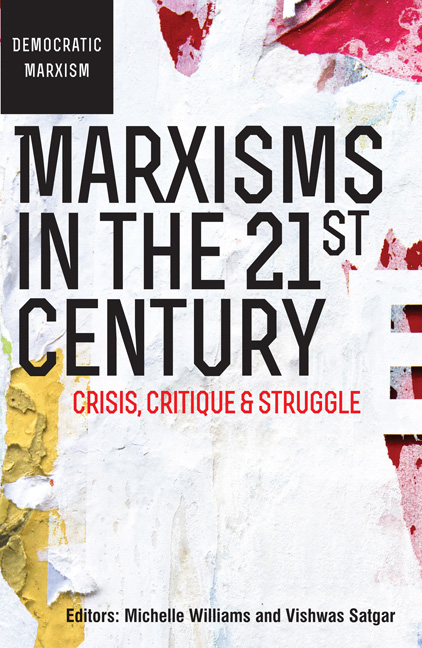Book contents
- Frontmatter
- Miscellaneous Frontmatter
- Acknowledgements
- Contents
- Acronyms and Abbreviations
- Introduction
- PART ONE DEMOCRATISING AND GLOBALISING MARXISM
- PART TWO MARXISM AND LEFT POLITICS
- Chapter 4 Notes on Critique
- Chapter 5 Marxism and Feminism: ‘Unhappy Marriage’ or Creative Partnership?
- Chapter 6 Marx and the eco-logic of fossil capitalism
- PART THREE CRISES OF MARXISM IN AFRICA AND POSSIBILITIES FOR THE FUTURE
- Conclusion
- Contributors
- Index
Chapter 6 - Marx and the eco-logic of fossil capitalism
from PART TWO - MARXISM AND LEFT POLITICS
Published online by Cambridge University Press: 21 April 2018
- Frontmatter
- Miscellaneous Frontmatter
- Acknowledgements
- Contents
- Acronyms and Abbreviations
- Introduction
- PART ONE DEMOCRATISING AND GLOBALISING MARXISM
- PART TWO MARXISM AND LEFT POLITICS
- Chapter 4 Notes on Critique
- Chapter 5 Marxism and Feminism: ‘Unhappy Marriage’ or Creative Partnership?
- Chapter 6 Marx and the eco-logic of fossil capitalism
- PART THREE CRISES OF MARXISM IN AFRICA AND POSSIBILITIES FOR THE FUTURE
- Conclusion
- Contributors
- Index
Summary
There is now increased recognition of the severity of the ecological crisis facing our planet, to the extent that even the president of a leading industrialised nation recently questioned the growth/consumption paradigm based on the abundant availability of natural resources, in particular fossil fuels such as oil. The sustainability of economic growth is in doubt because of the rapid depletion of non-renewable fossil fuels (particularly peak oil) and because of carbon emissions from the use of these fossil fuels in production and consumption processes. This has caused climate change resulting in, amongst other things, melting polar ice caps, rising sea levels, floods, drought and a host of other human-induced ‘natural’ disasters which can destroy the earth as we know it (Gore 2009; Magdoff and Foster 2011). In addition, other pollutants from industrial processes, such as acid mine drainage, acid rain and other toxins have polluted the air and rivers, destroying livelihoods and causing a wide range of public health problems, including new diseases that modern medicine is unable to cure (Hallowes 2011). The rapid advancement of industrial and urban growth is also destroying delicate local ecosystems, making a wide range of flora and fauna extinct, thus threatening the planet's precious biodiversity that holds the key to much of the hitherto-unknown inner workings of the entire ecosystem that governs the earth's existence (Cock 2007).
This ‘eco-logic’ of industrial capitalism (Friedman 2008) is an intricate web of economic and ecological processes that feed off each other, with very specific social consequences. While the social critique of capitalism (pivoted around the capital–labour contradiction) is associated with Marxist and neo-Marxist paradigms that have emerged over the past century and a half, the ecological critique has been mainly the preserve of environmentalists who have drawn inspiration from non-Western thought (including Native American and Eastern philosophical thought). Indeed, Marx and the varieties of Marxism that flowed out of his thinking over the past century have usually been lumped together with other products of the Enlightenment, allegedly sharing a similar anthropocentric belief in the domination of nature (itself a product of Christian thinking), but departing from Christianity in its belief in the wonders of science and technology and the idea of historical progress (Barry 2004; Ponting 2007).
- Type
- Chapter
- Information
- Marxisms in the 21st CenturyCrisis, Critique & Struggle, pp. 143 - 166Publisher: Wits University PressPrint publication year: 2013



